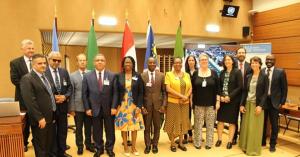Bringing together countries to share progress and experience on how to effectively manage their shared waters is a key characteristic of the Water Convention. Cooperation for the management of transboundary waters to promote sustainability, peace and security is the Convention’s mantra - especially relevant as climate change increases pressure on the world’s water resources.
With four new Parties (Cameroon, Nigeria, Iraq and Namibia) since its last meeting in June 2022, the Working Group on Integrated Water Resources Management under the Water Convention gathered 300 participants, including government representatives from over 80 countries, in Geneva and online, from 19 to 21 June 2023, to review progress of the work under the Convention and guide its future implementation.
The meeting took place in a decisive year for international water cooperation: in March 2023, the global community gathered in New York for the UN 2023 Water Conference, the most important UN conference on water in the past four decades. Renewed political momentum led to the submission of more than 700 voluntary commitments and pledges to the Water Action Agenda, including over 40 commitments on transboundary water cooperation. In July 2023, at the High-level Political Forum on Sustainable Development (HLPF), SDG 6 on clean water and sanitation will be under review and a full day special event will be dedicated to the follow up of the Water Action Agenda. During the Working Group meeting, the high visibility of the Water Convention at the UN Water Conference was recognized, and Parties and partners expressed their determination to follow up on the implementation of commitments in the Water Action Agenda related to transboundary water cooperation. The Working Group also highlighted the necessity to include the call for increased transboundary water cooperation in subsequent political declarations, such as for the upcoming 2023 SDG Summit.
The meeting welcomed the four new Parties to the Water Convention, and numerous countries also reported on progress in their process of accession to join the Convention.
Discussions reflected the diverse areas of work and wide range of partners of the Convention. A thematic session on public participation facilitated a rich exchange on its importance for effective and sustainable transboundary river basin management. A Nigerian civil society representative highlighted the key role of women as water users, managers, and decision-makers, and their active involvement ensures that water management is effective. A practical example illustrated her point: women in the River Benue region are leading sustainable fish farming initiatives, providing food and income for their communities. Critical reflections came from a Senegalese civil society representative: despite the recognition of public participation as one of the key principles of natural resource governance at local, national and global level, stakeholder participation remains low, sometimes theoretical and often instrumentalized.
At the meeting, plans were also presented for the 10th session of the Meeting of the Parties, to be held from 23–25 October 2024 in Ljubljana. The Meeting of the Parties is the main governing body of the Convention, and is held every three years. In between the sessions of the Meeting of the Parties, the Working Group, one of its subsidiary bodies, supports the implementation of the Convention.


